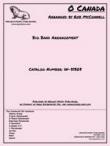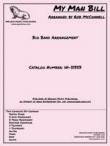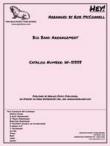GEE BABY, AIN'T I GOOD TO YOU
Arranged by Rob McConnell, Prepared by Dylan Canterbury, Rob DuBoff, and Jeffrey Sultanof

Cat #: JLP-7006
$32.50This item usually ships within 1 business day.
Questions?
Please call +1-518-587-1102 or email us.
Edition: Jazz Big Band Arrangement
Description: Swing - Difficult
Publisher: Jazz Lines Publications
Featured instrument: Guitar
Recorded by the Boss Brass on their 1995 album Don't Get Around Much Anymore, this Rob McConnell arrangement of the classic standard Gee Baby, Ain't I Good To You is infused with an appropriately bluesy aesthetic. It largely serves as a feature for guitarist Lorne Lofsky, both on melody and improvised solo.
Things kick off at a subdued dynamic level, with a somewhat tranquil melody line played by two clarinets (one standard, one bass). At first, the only accompaniment is some quasi-stop-time work from the trombones and horns before the rhythm section's entrance at measure 5. This is followed up four bars later by the melody four bars later, handled entirely by guitar. The stop-time feel returns briefly at measure 17, this time with trumpets included, before a sudden swell in volume into measure 25.
A four-bar ensemble mini-shout serves as a sendoff into an improvised guitar solo that lasts for two choruses. Both choruses are mostly free of horn backgrounds, but on the occasions that they come in, they should be kept soft and low-key. This all shifts away by measure 56, where an ascending trumpet line leads into the full ensemble shout chorus proper. While only eight bars in length, there are enough harmonic substitutions and rhythmic quirks to last for much longer. v The second half of the melody at measure 66 is played the same as before. Things begin to wrap up at measure 74, where the guitar solos over a looped harmonic vamp while some rhythmically dense backgrounds act almost like a final shout chorus. The band holds a series of pads over which the guitarist continues to solo, complete with breaks in between, ultimately wrapping up with a fairly standard blues ending riff.
This arrangement is for jazz big band. One alto sax part doubles on clarinet, and baritone sax doubles on bass clarinet. Alternate trumpet and trombone parts have been included as substitutes for the horn in F parts.
2 Alto Saxophones (Alto Sax 2 Doubles Clarinet)
2 Tenor Saxophones
Baritone Saxophone (Doubles Bass Clarinet)
5 Trumpets
2 Horns in F (Or Trumpet 6 and Trombone 5)
3 Trombones
Bass Trombone
Guitar
Piano
Bass
Drums
Horn 1: B5
Trombone 1: Ab4









![HEY! [DOWNLOAD] View: HEY! [DOWNLOAD]](https://www.ejazzlines.com/wp-images/product/thumbnail/w51359.jpg)

